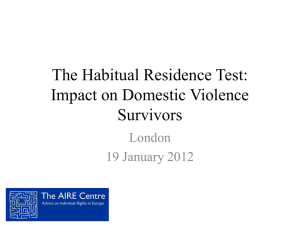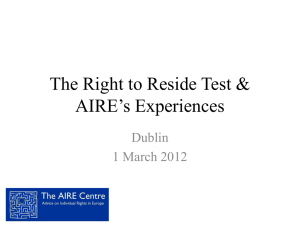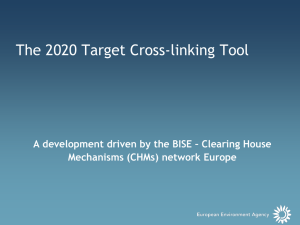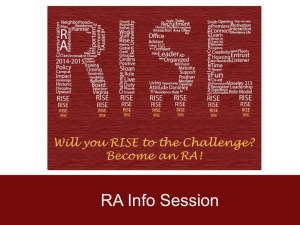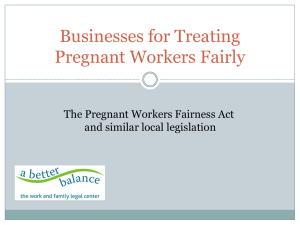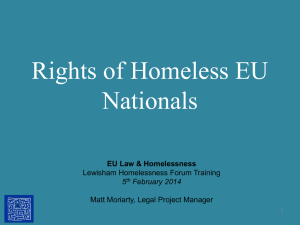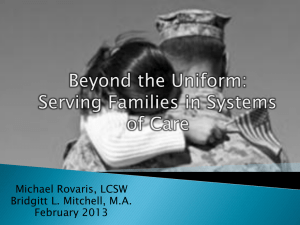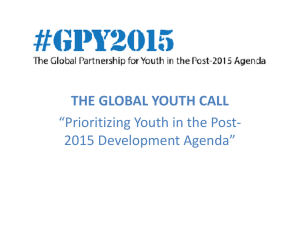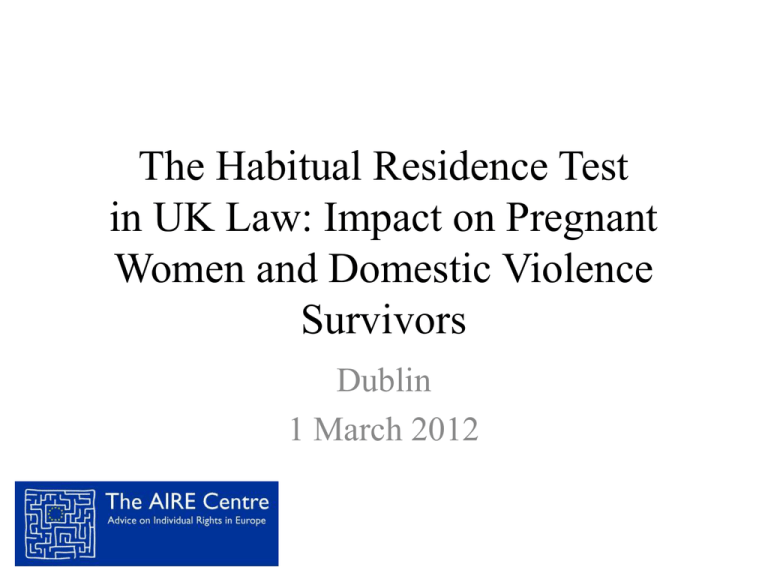
The Habitual Residence Test
in UK Law: Impact on Pregnant
Women and Domestic Violence
Survivors
Dublin
1 March 2012
Objectives of This Session
1. Identify challenges pregnant women and survivors of
domestic violence often face when attempting to
demonstrate that they have a ‘right to reside’ in the UK
under EU law.
2. Identify possible solutions to these challenges based on
EU law.
3. Increase awareness of the impact of facially-neutral
provisions of EU law and national implementing
legislation on women.
Topics We Will Cover
1. The habitual residence test in UK law: What is
it?
2. How the habitual residence test affects domestic
violence survivors
3. Special challenges pregnant women face in
showing that they have a ‘right to reside’ under
EU law
4. Legal strategies for helping pregnant women and
domestic violence survivors facing problems
related to the habitual residence test.
The Test
‘Actual’
habitual
residence
Not a
person
from
abroad
‘Right to
reside’
The problem will almost always be the rightto-reside test.
Domestic Violence and Pregnancy:
Related Phenomena
• The British Journal of Obstetrics and
Gynaecology estimates that one in six pregnant
women suffers domestic violence.
• Approximately 30% of domestic violence in the
UK begins or worsens during pregnancy.
• The AIRE Centre has observed a strong nexus
between pregnancy, domestic violence and
homelessness among clients who have sought our
advice.
Domestic Violence
Domestic Violence: What Is It?
The Domestic Violence Cycle
As benefits advisers, the AIRE Centre usually works with survivors who have already
left their partners and therefore escaped this cycle. However, it is important for
anyone working with domestic violence survivors to understand the pattern of abuse.
Talking to Clients About Domestic
Violence
For both cultural and psychological reasons, some clients may not realise that things an abuser has done
constitute domestic violence.
Examples of questions an adviser can ask to start a discussion about these things include:
•
Has your spouse/partner ever done anything to you that made you uncomfortable or put you in
pain? (E.g. pushing, pulling hair, burning, hitting, twisting arm, exposure to hot/cold temperatures)
•
Has your spouse/partner ever made you do anything sexually that you didn’t want to do?
•
Has your spouse/partner ever threatened you? Have they ever done anything to intimidate you, e.g.
smashing or throwing things?
•
Does your spouse/partner say things that embarrass you or make you feel bad about yourself?
•
Does your spouse/partner let you have your own money?
•
Does your spouse/partner let you visit and talk to your family and friends?
•
Does your spouse/partner follow you or monitor what you do?
•
Does your spouse/partner hurt or threaten to hurt your children, or threaten to take them away?
•
Does your spouse/partner mistreat children, family members or animals in order to frighten you or
make you feel bad?
Domestic Violence and EU Free
Movement Law: The Myths
Abusive EEA nationals often lead victims to believe that:
•
The victim’s right to reside in the UK is dependent on maintaining the
relationship with the abusive partner. No other family relationships count.
•
•
If the abusive partner leaves the UK, the
victim will lose her right to live here and will
be removed.
If the victim divorces the abusive partner or
terminates the civil partnership, she will
automatically lose her right to live and work
here.
Photo: Salil Biswas
http://www.treklens.com/gallery/Asia/India/photo90395.htm
Facts: Non-EEA Family Members of
EEA Nationals
Under Directive 2004/38, non-EEA national family members of EEA nationals are
entitled to live, work and claim benefits in the host Member State as long as the EEA
national is exercising treaty rights there.
Family members include spouses, civil partners, children and stepchildren under 21,
older children and stepchildren who are dependent, and dependent relatives in the
ascending line.
Under ECJ case law, a marriage lasts until there is a final divorce decree. A civil
partnership lasts until it is legally terminated.
In certain circumstances, non-EEA family members can retain their residence rights
after divorce or the end of the civil partnership.
After five years, non-EEA family members can acquire permanent residence.
Facts: Retaining a Right of Residence
If the EEA Citizen Leaves the Host
Member State: EEA Nationals
Article 12(1) of Directive 2004/38
‘The Union citizen's death or departure from the host Member State shall not affect the
right of residence of his/her family members who are nationals of a Member State.’
This means that an EEA national family member will have his/her own right to reside if
s/he begins to exercise treaty rights, e.g. by working or becoming self-employed.
Problems frequently arise, however, for domestic violence survivors with childcare
responsibilities, a lack of economic resources or housing, or medical or psychological
problems resulting from the abuse (e.g. drug abuse problems).
Additionally, abusers will often deliberately undermine a survivor’s efforts to find or
keep employment (e.g. by calling the workplace frequently).
Facts: Retaining a Right of Residence If the EEA
Citizen Leaves the Host Member State:
Non-EEA Nationals
•
Article 12(3) of Directive 2004/38: ‘The Union citizen's departure from
the host Member State or his/her death shall not entail loss of the right of
residence of his/her children or of the parent who has actual custody of the
children, irrespective of nationality, if the children reside in the host
Member State and are enrolled at an educational establishment, for the
purpose of studying there, until the completion of their studies.’
•
Ibrahim (European citizenship) (ECJ 2010):
•
•
‘The children of a national of a Member State who works or has worked
in the host Member State and the parent who is their primary carer can
claim a right of residence in the latter State.’
A non-EEA Ibrahim parent is not required to have comprehensive
sickness insurance or sufficient resources to prevent them from becoming
a burden on the UK social assistance system.
Facts: Retaining a Right of Residence
After a Divorce
Article 13 of Directive 2004/38 provides that the spouse
of an EEA national exercising treaty rights can retain a
right to reside in the UK following a divorce, annulment
or termination of civil a partnership if…
•
… The spouse/partner is an EEA national and is exercising her own treaty
rights, or begins to do so.
•
•
… Prior to the initiation of the divorce or annulment proceedings or the
termination of the civil partnership, the marriage or partnership has lasted at
least three years, including at least one year in the host Member State.
… The spouses/partners agree, or the court orders, that the non-EEA parent will
have custody of the couple’s children.
•
•
… The retention of residence rights is ‘warranted by particularly difficult
circumstances’, including domestic violence that occurred during the
marriage/partnership.
… Under some circumstances, when the non-EEA spouse/partner has a right of
access to a minor child.
•
Non-EEA nationals fulfil the conditions for qualifying as a worker, selfemployed person or self-sufficient person. This can be problematic for domestic
violence survivors.
Challenge: When the Abuser is the
Only Source of EU Rights
Case Study #1
Marie is a Senegalese national who married a French national in 2010.
In May 2011, her husband came to the UK to work, and she joined him
in June. Since her arrival, she has been self-employed part-time as a
cleaner. In December, she fled the marital household due to severe
physical abuse. She and her husband are now separated but not
divorced. They have no children. Her husband has refused to provide
her with any of his payslips or other documentation that would show he
is working, and has threatened to harm her if she contacts his employer.
She has no other family members in the UK, and her husband kept all
of the money she earned through her self-employment. She is now
homeless and would like to claim benefits.
Challenge: Abusive Partners in Prison
Case Study #2
Anna is a Thai national married to a German national. The couple came
to the UK in June 2011, and the husband began working. Throughout
the marriage, the husband committed violent acts against Anna. In late
2011, the husband beat Anna with an iron bar, was arrested and was
ultimately sentenced to a prison term. While he is in prison in the UK,
does Anna have a right to reside there?
This issue remains unsettled. UK tribunal jurisprudence suggests,
without establishing, that the answer is no. Meanwhile, CJEU
jurisprudence concerning Turkish nationals suggests that the answer
may be yes.
Challenge: Primary Carers of Young
Children
Abusive partners often refuse to allow their victims to have
any money or other resources.
This means many domestic violence survivors with young
children feel compelled to stay with their abusers because they
cannot pay for childcare if they leave and try to take up work.
In the UK, local authorities may then threaten to take the child
away from the home where the abuse is occurring, or they may
threaten to take the child away from an EEA victim who leaves
the home but cannot become economically active.
Challenge: Chen Parents
Under the ECJ’s ruling in Zhu and Chen, self-sufficient EEA
national children are entitled to be joined by their primary
carers.
If a domestic violence survivor has a child who is an EEA
national but is too young to be enrolled in compulsory
education, she will not qualify as an Ibrahim parent, but she
may still have a right to live in the host Member State as a
Chen parent if the child is self-sufficient.
In the UK, Chen parents do not have a right to work.
Pregnancy
Why are we talking about pregnancy
today:
A) On-going litigation in the JS case decided by the
Court of Appeal in July 2011.
B) AIRE Centre experience with pregnant EEA
nationals/non EEA partners of EEA nationals
who encounter difficulties in receiving social
security benefits. The main difficulty is to meet
the requirements of the ‘right to reside test’ when
they apply for social security benefits during or
right after pregnancy.
Article 7 (3) Directive 2004/38/EC
Article 7 (3) allows EEA nationals who are workers or self-employed to retain
the status of ‘worker’ if they are temporarily unable to work as result of illness
or accident, or involuntarily unemployed and duly recorded as a jobseekers.
This is because they retain a relevant link to the job market.
Article 16 (3) allows breaks in residence of up to six months in any year or up
to twelve months for serious reasons such as pregnancy without interrupting
continuity of residence for the purpose of acquiring permanent residence.
Dias C-325/09 paragraph 20: The ‘right to reside’ which entitles the holder to
claim income support is not expressly defined. Since May 2004, national law
had sought to restrict payment of that benefit in order to ensure that certain
person do not become an unreasonable burden on the social assistance system.
Article 7(4) Directive 2004/38/EC
Article 7(4) states that only the spouse/registered
partner and dependent children shall have the right
of residence as family members of a Union citizen
who retains the status of worker under Article 7 (3)
(b) and (c) (involuntary duly recorded
unemployment and genuinely seeking jobs).
Unmarried pregnant partners don’t qualify.
Challenge for pregnant women
A pregnant woman who ceases to work
temporarily due to pregnancy, who is not on
maternity leave and does not fall in one of the
categories listed in article 7(3) does not retain the
right to reside and cannot access those benefits
subject to the right to reside test, such as Income
Support, Housing Benefits, Council Tax
Benefits. The real problem is for cases that fall
under Article 7 (3) (a) only: the JS scenario.
JS v Secretary of State for Work and
Pensions [2011] EWCA Civ 806
The claimant is a French national who came in the UK in 2006 and worked for more
than a year. Then she enrolled in a Post-Graduate Certificate in Education course for
modern languages at the Institute of Education, University of London. Her tuition fees
were funded by a student loan and she was supported by a bursary. She became
pregnant, the expected date of confinement being 2 June 2008. Realising that she
would have given birth prior to the end of her course she withdrew from her studies as
of 1 February 2008. Her bursary payments ceased. She undertook agency work from 22
January 2008, hoping to find teaching assistant positions in secondary schools. None
was available so she took agency positions working in nursery schools. By 12 March
2008 the demands of caring for nursery school children while some 6 months pregnant
were proving too much and she stopped such work. The claimant looked
unsuccessfully for lighter work for a few days before giving up doing so and on 18
March 2008 claiming income support, which was refused. Her baby was born on 21
May 2008. Some three months later, the claimant resumed employment. Sadly, in My
2009, the baby died from a heart condition.
AIRE Centre has given advice in
cases where pregnant women were:
-
EEA national forced to quit work by abusive partner who
was a British citizen;
- Non EEA national unmarried partners of an EEA national;
- EEA national left by partner;
- EEA national forced to leave home following break down
of relationships (due to pregnancy) between family
members they were depending on;
- Jobseeker who stops seeking job right after giving birth;
- Self-employed person who quits job due to pregnancy;
NB: Often the woman was working or studying in the UK for
a year or more before pregnancy.
Other possible cases:
- EEA national self-employed person who is
single mother;
- EEA student who withdraw from the course
due to pregnancy.
We observed that
The circumstances in which a woman finds
herself right before or after giving birth are often
such to prevent her from seeking jobs or working
either as an employee or a self-employed person.
We think that
The absence of a provision stating that a woman
may retain her right to reside constitutes an
inequality which affects women’s enjoyment of
the right of free movement under EU law.
What is at issue in JS case?
Interpretation of Article 7(3) Directive 2004/38/EC
- Argument #1: Article 7(3) is not comprehensive:
it confers a right to reside to women who, having
become pregnant, ceased work temporarily.
- Argument #2: Article 7(3) is comprehensive:
unfair discrimination against pregnant women who,
as a result of pregnancy, cannot work.
The reasoning in JS decision
1. The circumstance of a woman who decides not to return to work following
the expiration of maternity leave or who gives up employment to care for a
child but anticipates a return after some yet unknown time are very common
and are not analogous to those in art 7 (3) (a).
2. This does not constitute indirect discrimination: a national who gives up
work to care for children may be of either gender as well as a person who
gives up work to care for an elderly relative.
3. Extending the meaning of article 7 (3) (a) to include ‘pregnancy’ would be
illegitimate judicial legislation.
4. The effect of this insertion would be uncertain: for how long before and
after the expected date of delivery would the status of worker be retained?
5. The text of Article 7 was intended to be complete and comprehensive.
6. Pregnancy was deliberately excluded from art 7 and included in article 16
(permanent residence).
How we can attack this reasoning?
• Arguing a discrimination on the grounds of sex:
Article 7 (3) constitutes an unlawful discrimination on
the grounds of sex contrary to general principles of EU
law where it does not provide that pregnant women
retain the status of worker at least for a specified
period before and after the birth of the child.
• There are other pieces of EU legislation that prohibit
sex discrimination (both direct and indirect) in the
granting of social assistance and social security
benefits.
Most relevant EU legislation
•
•
•
•
Articles 20, 21 and 23 of the Charter of Fundamental Rights of the
European Union.
Directive 79/7/EC on the progressive implementation of the
principle of equal treatment for men and women in matters of
social security.
Directive 76/207/EEC on the implementation of the principle of
equal treatment for men and women as regards access to
employment, vocational training and promotion and working
conditions as amended by Directive 2002/73/EC.
Directive 92/85/EEC on the introduction of measures to encourage
improvements in the safety and health at work of pregnant workers
and workers who have recently given birth or are breastfeeding.
General principles of EU law: respect
for fundamental human rights.
•Equal treatment and non discrimination of men and
women is a basic principle of EU law Case 43/75
Defrenne.
•Article 3 of the Treaty establishing the European
Community provides that promoting equality
between men and women is one of the Community’s
essential tasks.
•Article 3 (2) of the same Treaty requires the
Community to aim at eliminating inequalities and
promoting equality between men and women in all
its activities.
Substantive equality
EU law is concerned with substantive equality
rather than formal equality of pregnant women and
women on maternity leave by
- reducing de facto inequalities which may arise in
society and,
- preventing or compensating for disadvantages in
the professional career of the relevant person (see
Alvarez v Sesa Start Espana ETT SA)
Substantive equality
Achieving substantive equality often involves
more favourable treatment of women.
Case C-394/96 1998 Brown v Rentokil Ltd: more
favourable treatment of women is necessary in
order to remove the disadvantages associated
with pregnancy and absence on maternity leave.
Pregnancy as ‘special situation’ –
EU law
Case C-342/93 Gillespie and others: women taking maternity leave
find themselves in a situation which cannot be equated to that of a man
nor with that of a woman actually at work. This special situation
requires special protection.
In the legal systems of some Member States, statutory maternity leave
takes the form of a prohibition of work and thus constitutes, for the
woman concerned, a status she cannot waive. (...) However, this does
not prevent periods of absence taken in connection with maternity leave
from being considered as periods of employment, for the purposes, at
any rate, of social security. Paragraph 41, Opinion of Advocate General
Alber in Case C-218/98 Oumar Dabo Abdoulaye and Others.
Other remarks
• Purely financial considerations do not in any
event constitute a material reason which would
make discrimination on the grounds of sex
permissible. Also, unequal treatment on the
grounds of sex cannot be justified by referring to
budgetary considerations (C-356/09 Kleist; C343/92 Roks and Others; C-4/02 Schönheit and
Becker; C-5/02; Steinke; C-196/02 Nikoloudi).
Other remarks
Men do not get pregnant and therefore they will never lose their worker status
for this reason. Family members of a qualified male EEA national never face
the risk of losing the benefits that they are entitled to in that position by virtue
of the man becoming pregnant.
However, a woman does face the risk of losing her right to reside when she
becomes pregnant. If she is no longer a qualified person once she loses the
worker status due to pregnancy, then her family members who were dependent
on her status as a qualified person are no longer eligible for benefits.
This supports the AIRE Centre’s opinion that the treatment of pregnant women
as regards their exclusion from Article 7 (3) of Directive 2004/38/EC
constitutes a discrimination which is not legally justified under EU law.
Summary
In our opinion Article 7 (3) Directive
2004/38/EC works against the achievement of
the objective of equal treatment of men and
women, which is a basic principle of EU law, by
discriminating against pregnant women. Also, it
works against the achievement of freedom of
movement of EU citizens, which is the objective
of Directive 2004/38/EC.
Discussion

